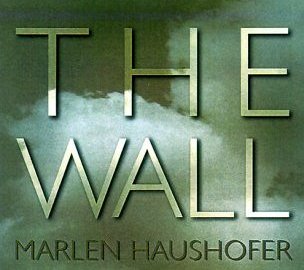On Marlen Haushofer’s The Wall | By Debbie Urbanski

There is something genuinely seductive about postapocalyptic novels. The fascinating little details—how will people get food? what will they wear? where will they sleep? The lack of typical urban angst (no one is entering couples counseling or concerned about their own happiness in postapocalyptic worlds, thank God). And real heroics are possible once the rest of the world disappears and there are man-eating creatures chasing your loved ones. But before I get to one of my favorite books, an out-of print postapocalyptic novel that I’ve never yet convinced anybody to read, let’s consider a postapocalyptic book that everyone has read: The Road, by Cormac McCarthy. It’s a page-turner, in the best sense of the genre. It’s an overwhelmingly beautiful portrait of a father’s love for his child. It’s a great book. But, let’s admit it, like a lot of postapocalyptic books, The Road is a man’s book. A book about men, written by a man, and when women do, by chance, appear, they tend to be dead, or sex slaves pregnant with babies who will be eaten by other humans.
For a domestic alternative to The Road’s postapocalyptic man-fest, consider The Wall, an amazing 1962 novel by Austrian writer Marlen Haushofer. The plot (if you can call it that) is fairly simple: a woman is vacationing in the mountains when some unexplainable tragedy wipes out most of humanity. She’s left with a dog, a cat, and a cow for companions. For most of the novel, there are no other humans to contend with. The woman repairs her house. She tries to grow things. She takes care of her animals. She loves her animals. She prepares for winter. Then she prepares for spring. She treks up to a higher grazing pasture during summer. Then there’s the fall. She’s quite content. In fact, she spends a lot of time sitting and staring at the mountains. She almost loses herself in the largeness of the world. She writes in her journal. She does not miss her old life. There are very few flashbacks. You cannot make this plot sound gripping. In fact, a book about a woman whose major companion is her dog may sound like tortuous reading. But The Wall is gripping, please trust me, though why is still somewhat of a mystery to me. How does Haushofer make a woman’s minute reflections of being alone so fascinating? Haushofer writes cleanly and brilliantly, with masterful precision. I’m tempted to reproduce the entire book here as proof, but I’ll try to hold back. Here’s the woman, musing about the future of her animals while pondering her own future:
Perhaps, in the spring, the cat will run back into the forest and have kittens again. Who knows. The big forest tom-cat may well be dead, or, after her serious illness last year, the cat may never be able to have kittens again. But if there are young cats, it will happen all over again. I shall make up my mind not to care for them, then I’ll grow fond of them, and then I’ll lose them. I often look forward to a time when there won’t be anything left to grow attached to. I’m tired of everything being taken away from me. Yet there’s no escape, for as long as there’s something for me to love in the forest, I shall love it; and if some day there is nothing, I shall stop living.
And how satisfying, to read such existential and somewhat heartbreaking musings–and there are many such musings in this book–alongside the grounded descriptions of practical things, like chopping firewood:
Spring was blossoming around me and all I could see was the wood. The yellow pile of sawdust grew daily. Resin stuck to my hands. Splinters pierced my skin, my shoulders hurt, but I was as if possessed by the wish to cut as much wood as possible.
The Wall is a quiet book about domesticity, planting, beauty, the rhythms of keeping house, the land, human nature—and what a person can love in a people-less world. I consider it The Road’s antithesis. In contrast to McCarthy’s characters, who are toiling desperately for their survival in an ugly world, The Wall suggests our disappearance from the planet need not seem a tragedy. Rarely do postapocalyptic worlds appear as utopias, but the new world Haushofer has created certainly resembles one, if the term utopia still applies when there aren’t any people. “I’d spent most of my life struggling with daily human concerns,” the woman in The Wall says. “Now that I had barely anything left, I could sit in peace on the bench and watch the stars dancing against the black firmament.”
*
NER Digital is a creative writing series for the web. Debbie Urbanski’s fiction has appeared (or will soon appear) in NER, Southern Review, Indiana Review, the Santa Monica Review, and in the anthology New Stories from the Midwest 2012 (Indiana University Press). She lives with her family in Syracuse, New York and hopes to write a post-apocalyptic novel before the world actually ends.